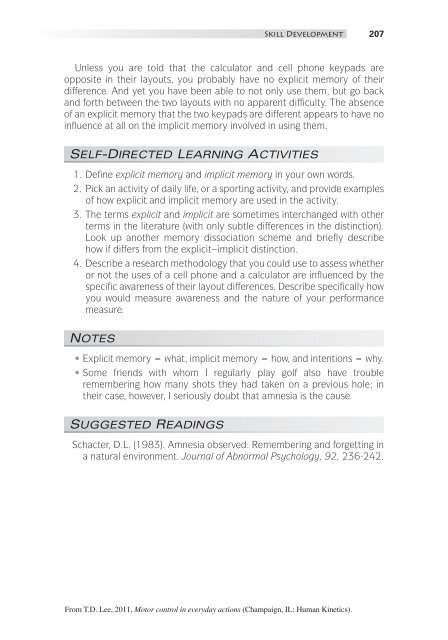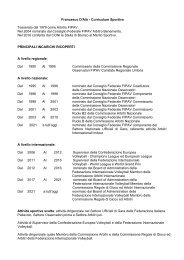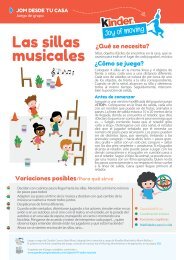Create successful ePaper yourself
Turn your PDF publications into a flip-book with our unique Google optimized e-Paper software.
Skill Development<br />
207<br />
Unless you are told that the calculator and cell phone keypads are<br />
opposite in their layouts, you probably have no explicit memory of their<br />
difference. And yet you have been able to not only use them, but go back<br />
and forth between the two layouts with no apparent difficulty. <strong>The</strong> absence<br />
of an explicit memory that the two keypads are different appears to have no<br />
influence at all on the implicit memory involved in using them.<br />
Self-Directed Learning Activities<br />
1. Define explicit memory and implicit memory in your own words.<br />
2. Pick an activity of daily life, or a sporting activity, and provide examples<br />
of how explicit and implicit memory are used in the activity.<br />
3. <strong>The</strong> terms explicit and implicit are sometimes interchanged with other<br />
terms in the literature (with only subtle differences in the distinction).<br />
Look up another memory dissociation scheme and briefly describe<br />
how if differs from the explicit–implicit distinction.<br />
4. Describe a research methodology that you could use to assess whether<br />
or not the uses of a cell phone and a calculator are influenced by the<br />
specific awareness of their layout differences. Describe specifically how<br />
you would measure awareness and the nature of your performance<br />
measure.<br />
Notes<br />
• Explicit memory = what, implicit memory = how, and intentions = why.<br />
• Some friends with whom I regularly play golf also have trouble<br />
remembering how many shots they had taken on a previous hole; in<br />
their case, however, I seriously doubt that amnesia is the cause.<br />
Suggested Readings<br />
Schacter, D.L. (1983). Amnesia observed: Remembering and forgetting in<br />
a natural environment. Journal of Abnormal Psychology, 92, 236-242.<br />
From T.D. Lee, 2011, Motor control in everyday actions (Champaign, IL: Human Kinetics).

















